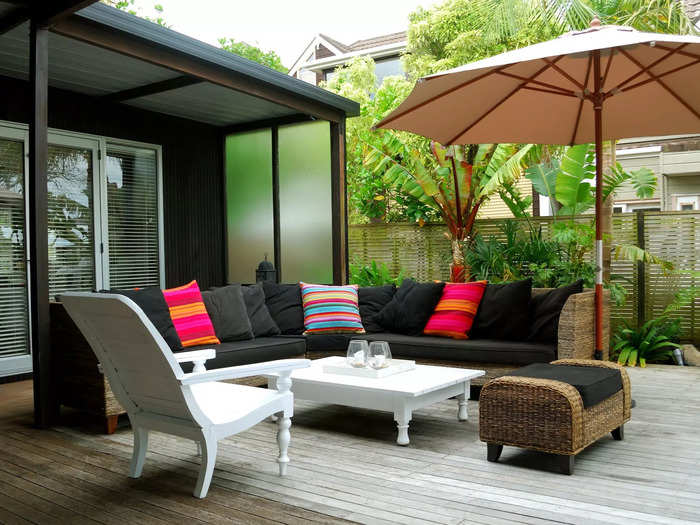
Outdoor space can be even more enjoyable when it isn't cluttered. Antonioxs56/Shutterstock
Business Insider asked two gardeners and two interior designers which items you need to get rid of from your outdoor space.
Here’s what the experts said.

Excessive, mismatched furniture and accessories quickly make an area feel cluttered rather than cohesive, according to Keely Smith, lead interior designer at JD Elite Interiors.
“Select just a few on-theme items like a curated plant display or outdoor sculpture, and forgo extras that distract from the focal pieces,” she told BI.

The age of the giant planter on your back patio has come to an end, according to Anna Ohler, gardener and owner of Bright Lane Gardens.
"These large, round planters tend to look great for the first season but slowly fade and degrade over time," she told BI.
They're also difficult to move and can cause water staining under wherever they sit.
Ohler recommended built-in flower boxes that match your deck or siding. They can usually fit more plants, and they can be insulated to accommodate plants that come back annually.

Lawn ornaments, wind chimes, spinners, and other synthetic garden decor can distract from the natural environment, according to Barbi Gardiner, gardener, bioregional herbalist, and founder of The Outdoor Apothecary.
Consider replacing these with items made from natural materials such as stone, wood, or even recycled metals that can blend more seamlessly into your garden.

Worn-out furniture should be removed to make way for more durable, high-quality pieces suited to outdoor use.
"Harsh weather and sun can quickly deteriorate low-quality materials, leaving furniture with a tired, uneven appearance that dates the space," Smith told BI.
The designer said more weather-resistant options, like wood-slatted seating and wicker accessories, stay fresh season after season.

Having a stack of unused wood can clutter your space and attract unwanted pests, according to Mariya Snisar, head of interior design at Renowell.
"Repurpose or remove the wood, and turn it into a stylish fire pit," she told BI. "Alternatively, you could simply keep a more organized and purposeful wood-storage area."

Bright and harsh outdoor lighting can cause discomfort and create an unwelcoming vibe, according to Snisar.
"Embrace the warmth of soft outdoor lighting strategically placed around your space," she told BI. "Lanterns or fairy lights can provide a welcoming glow, setting the perfect mood for relaxation and enjoyment."

As awareness around the importance of native plants continues to grow, many homeowners are ready to swap out some of their invasive ornamental species.
"Plants like burning bush and barberry, though popular for their aesthetics, can overrun native ecosystems," Gardiner told BI.
As an alternative, consider native shrubs and plants that support local wildlife while still offering vibrant colors. You can look up what's native in your area online.

Snisar told BI that citronella candles can sometimes look unsightly in otherwise beautiful outdoor spaces.
The designer recommended going for a more modern solution such as insect-repelling plants or stylish, citronella-infused diffusers for a bug-free and aesthetically pleasing outdoor experience.

Tropical kitsch might have been a hit in previous decades, but it's time to ditch the tiki bar, according to Snisar.
"Upgrade to a more sophisticated outdoor lounge setup with sleek furniture, cozy lighting, and a well-designed outdoor bar for a more timeless and stylish feel," she told BI.

Single-type flower beds, also known as monocultures, need to go for several reasons.
"A monotonous bed of identical flowers can appear dull and uninspired, missing the vibrant and dynamic energy that mixed varieties provide," Snisar said. "Mix it up with various flowers of different heights, textures, and colors."
Gardiner also told BI that single-species gardens can be more susceptible to pests and diseases because they often require more pesticides and maintenance.
"Diverse plantings encourage a balanced ecosystem and reduce the need for interventions," she told BI.
 Exploring the world on wheels: International road trips from India
Exploring the world on wheels: International road trips from India
 10 worst food combinations you must avoid as per ayurveda
10 worst food combinations you must avoid as per ayurveda
 Top seeds that keep you cool all summer
Top seeds that keep you cool all summer

Copyright © 2024. Times Internet Limited. All rights reserved.For reprint rights. Times Syndication Service.